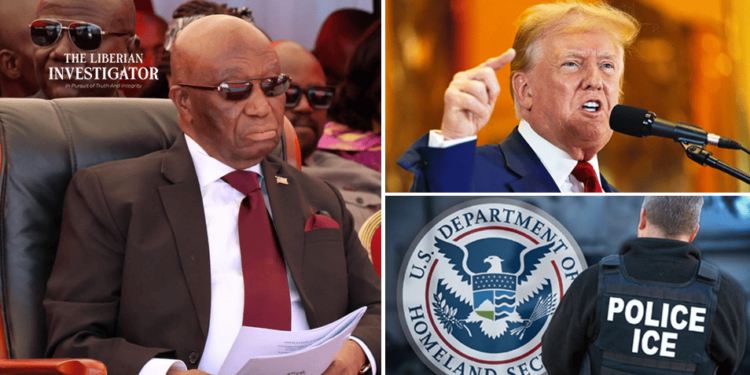MONROVIA – In a startling statement that has sent shockwaves through the Liberian diaspora, President Joseph Boakai has come under intense criticism for remarks perceived as mocking Liberians residing in the United States. Speaking recently, Boakai said, “…Because you sitting down conveniently in the States or somewhere enjoying, you think you enjoying life? But we got a message for you… Donald Trump coming for you.” The comment, made amid heightened fears of deportation for undocumented Liberians, has been widely condemned as insensitive, tone-deaf, and counterproductive.
Prominent members of the Liberian community in the U.S. have reacted with outrage, noting the critical contributions of the diaspora to Liberia’s economic stability and social development. Adding to the backlash is the fact that Liberians in the diaspora played a significant role in funding Boakai’s presidential campaign, a move now seen as having backfired given the President’s controversial remarks. Critics have also pointed out the irony of Boakai’s reliance on the United States for medical attention, juxtaposed with his apparent mockery of Liberians who reside there.
A Diaspora That Sustains Liberia
Stephen Binda, Chairman of External Relations for the Union of Liberian Associations in the Americas (ULAA), described the President’s statement as “shocking” and “uncalled for.” In an exclusive interview with The Liberian Investigator, Binda highlighted the indispensable role of Liberians in the U.S., who contribute over US$800 million annually in remittances—funds that are a lifeline for many families and a cornerstone of Liberia’s economy.
“We run the economy of Liberia,” Binda asserted. “So when the President goes to a program, instead of rallying the support of Liberians in the United States to come and develop our country, he turns around and uses such a platform to denigrate Liberians who are facing immigration challenges. It’s just being immune and counterproductive to our country’s growth.”
Binda called on Boakai to reconsider his approach, urging him to focus on creating an environment in Liberia conducive to returnees. He emphasized the need for strengthened rule of law, robust infrastructure, and effective governance to attract members of the diaspora back home. “Liberians want to return,” Binda said, “but the current situation in the country makes it impossible for them to do so.”
Contradictions and Insensitivity
Joey Kennedy, President of the Association of Liberian Journalists in the Americas (ALJA), described the President’s comments as a manifestation of insensitivity toward Liberians facing deportation challenges. Kennedy criticized the President for undermining efforts by the Ministry of Foreign Affairs to negotiate with U.S. authorities to prevent deportations.
“For the President, who should be spearheading such negotiations, to make mocking statements about these individuals publicly is deeply frustrating,” Kennedy told The Liberian Investigator. He pointed out the contradiction between Boakai’s remarks and the Ministry’s stated commitment to safeguarding the interests of Liberians abroad.
Adding to this is the fact that many Liberians in the U.S. contributed financially to Boakai’s campaign. “These are the same Liberians who worked hard, took on multiple jobs, and helped fund his rise to power,” Binda noted. “For him to make such statements now is not only unfair but a betrayal of their trust and support.”
Kennedy also pointed to Boakai’s frequent trips to the U.S. for medical treatment as further evidence of hypocrisy. “If the President relies on America for his health, how can he turn around and mock Liberians who have built lives there?” he asked.
Kennedy called for a public apology from the President, noting that many Liberians depend on remittances to pay tuition fees, build homes, and sustain their families. “Deporting those contributing to our nation’s development is counterproductive,” Kennedy said. “The government must take proactive measures to support Liberians in the diaspora rather than mocking their plight.”
Dispelling Deportation Rumors
Adding to the controversy are widespread rumors suggesting that between 110 and 1,500 Liberians are set to be deported from the U.S. Binda, however, categorically debunked these claims, citing confirmations from both the U.S. State Department and Liberia’s Ministry of Foreign Affairs. According to Binda, only three Liberians—each with prior legal issues—were recently deported.
“There is no list of 110 or 1,500 Liberians being sent back,” Binda clarified. “What the U.S. State Department has confirmed is that only three Liberians were set for deportation. These individuals arrived in Liberia last Wednesday. The rumors circulating on social media are simply not true.”
Despite the absence of mass deportations, the anxiety among Liberians in the U.S. remains palpable. Kennedy underscored the psychological toll of living in uncertainty. “Liberians are scared. Many of them have high blood pressure because they are living in fear of deportation,” he said. “The President should be offering messages of hope, not statements that mock or instill fear.”
Social Media Backlash
The President’s remarks have also ignited a firestorm on social media, where many Liberians have voiced their disapproval. Pleh B. Tosh called Boakai’s statement “disrespectful” and “childish,” comparing it to the President’s past approach toward Liberians at the Buduburam refugee camp in Ghana. Another commenter, Joseph Binda, accused the President of harboring “deep-rooted hatred” for the diaspora, while D. Eugene Wilson criticized the government for failing to create an environment that would encourage Liberians abroad to return.
“Those in America do not steal,” Wilson wrote. “They pay their rent, mortgage, car notes, light bills, water bills, and still sacrifice to send money home to take care of their relatives, contributing meaningfully to your economy.”
Others, like Mark D. Welleh Sr., defended the President, asserting that many Liberians in the U.S. have neglected their homeland. “There’s no place like home regardless of how difficult things might be,” Welleh argued. However, this minority perspective has done little to quell the overwhelming criticism directed at Boakai.
The Bigger Picture
The backlash against President Boakai’s remarks comes at a time when many Liberians are questioning the government’s priorities and leadership. Critics argue that the administration has failed to address the root causes of migration, including unemployment, poor infrastructure, and systemic corruption.
Samuel Fahnbulleh, another commentator, called on the President to focus on creating jobs and improving living conditions in Liberia. “You should be the last person to make fun of emotional situations with your citizens who are in pain,” Fahnbulleh wrote.
Dave Wilson, in a thoughtful critique, lamented the lack of vision in the President’s address. “Such a speech should have clearly articulated viable pathways to tackle the pressing challenges facing our country and the restive returnees,” Wilson wrote. “Where is the leadership?”









Discussion about this post